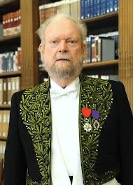
Jean Baechler, who was born in Thionville in 1937 and died in Draveil in 2022, was a political philosopher in the tradition of classical thinkers such as Aristotle, Locke, Montesquieu and Tocqueville. Emeritus Professor of historical sociology at the Sorbonne, member of the Académie des Sciences morales et politiques of the Institut de France, he was Raymond Aron’s most eminent disciple. His considerable work counts more than forty books of scientific rigour, written in a language of a yet unknown literary quality at such a level of abstraction.
After a thesis on suicides, the new reference since Durkheim, Jean Baechler, agrégé in history, in the course of time built a general theory of political regimes and even further of democracy itself. Taking mankind’s history from Paleolithic on as a laboratory, he confronted the facts supplied by ethnography, anthropology and historiography with the most rational hypotheses, bursting out quite a few received ideas. His first studies are summed up in a master work — Démocraties, Calmann-Lévy, 1984 — in which, following Mendeleïev’s method to make sure no element escapes him, he classifies political regimes in different species in a quest for discriminating factors which, when the tools are missing, forces him to create words in order to express new concepts.
In his Essai sur les origines du capitalisme (Gallilmard, coll. Idées), Jean Baechler demonstrates how it is politics that determines economics and not the reverse, thus taking the opposite view of the classical references of intellectual spheres. Among his other landmark works, it is fit to mention Qu’est-ce que l’idéologie ? (Gallimard, 1971) Le Pouvoir pur (Calmann-Lévy, 1978), Esquisse d’une histoire universelle (Fayard, 2002), Précis de philosophie politique (Hermann, 2014), in which he gathers the keys he proposes to decode the common foundation of science, sociology, philosophy and political history. In his Précis de la démocratie, written in 1993 on a request from UNESCO, he proves in a deep and dense 140-page argument why democracy is the natural regime of the human species, from which its pure and perfect model can be deduced. Justice appears here as the central value because it is the means through which peace, the alpha and omega of politics, is made possible. Only fair rules can lead to well-balanced democracies.
It is to be regretted that this fundamental work, which will stand out as a landmark in the history of ideas, has not been translated into English yet, a fact obviously hindering the progress of contemporary knowledge. On of the rare major intellectuals of our time passed away among general indifference and even the ignorance of his own compatriots, which tells much about our self-styled society of information.
G.L.
